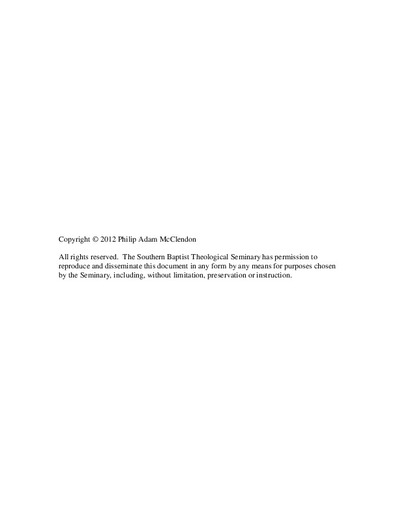Galatians 2:20 as a Corrective to Selected Contemporary Views of Christian Spirituality
Subject
Bible. Galatians, II, 20--Criticism, interpretation, etc.Bible--Use
Spirituality--Biblical teaching
Christian life
Spirituality--Biblical teaching
Abstract
This dissertation examines various contemporary Protestant views of Christian Spirituality in light of Galatians 2:20 in order to correct some common errors caused by the elevation of personal subjectivism and the misinterpretation of Scripture. The purpose is to demonstrate the continual necessity of the Scriptures as the normative grounds for evaluating and correcting the theological and practical expressions of Christian spirituality.
Christian spirituality focuses on the way that one lives as led by the Spirit in light of one's understanding of and experience with God. While the role of the Spirit in Christian spirituality is critical, direct emphasis on the necessity of grounding one's spiritual understanding and experience within the context of Scripture is often an absent element. Without the governing standard of the Bible, and with the increased influences of ecumenicalism, mysticism, secularism, subjectivism, and relativism within Protestantism, Christian spirituality remains somewhat ambiguous and covers a substantial range of religious beliefs to include biblical as well as extra-biblical ideas. Thus, to demonstrate how the Scriptures can help govern limits within Christian spirituality, Galatians 2:20 will be examined.
This dissertation, then, employs Galatians 2:20 as a guide for establishing essential concepts concerning the spiritual life and, in so doing, corrects some common misunderstandings of the spiritual life. Chapter 1 defines spirituality and provides a brief history of interpretation for Galatians 2:20.
Chapter 2 demonstrates that the cross is central to the justification of the believer and results in a transformation of life.
Chapter 3 reveals that the Spirit serves as Christ's representative to the believer empowering them for Christian living.
Chapter 4 emphasizes the reality that although the believer is to progress in sanctification, they will continually experience spiritual tension in this life between the Spirit and the desires of the flesh.
Chapter 5 explains that personal faith is the means by which the believer lives out the indwelling presence of the Spirit. This lived faith is motivated by the sacrificial love of God.
Chapter 6 provides a conclusion based on the preliminary thought regarding the necessity of biblical spirituality in light of some current trends within Christian spirituality.

